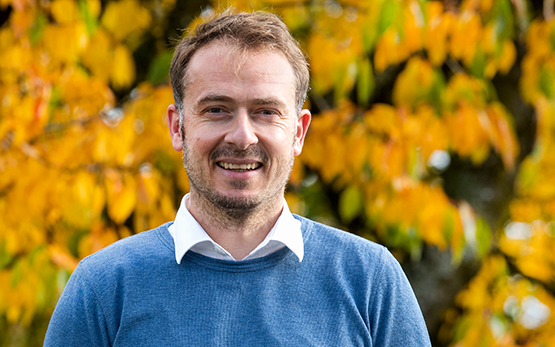Lutz Merbold has headed the ‘Agroecology and Environment’ Strategic Research Division since 1 October 2020. He brings to Agroscope the knowledge of sustainable agroecosystems which he acquired in Africa.
Lutz Merbold was born in Plauen (Saxony, Germany) on 8 April 1980 – at a time, he himself stresses, when the atmospheric concentration of CO2 was still 338.75 ppm. Today, it stands at over 415 ppm. The fact that he mentions this figure speaks for his desire to find solutions for the consequences of climate change on agriculture, whilst reducing the impact of agriculture on the climate.
Until recently, Lutz Merbold worked and lived in East Africa. As the Head of the Mazingira Centre (‘Mazingira’ means ‘environment’ in Swahili) at the International Livestock Research Institute in Nairobi, Kenya, he and his team collected environmental data. These were used to highlight solutions for a more sustainable agricultural sector: “I have always been drawn to where research could make an impact.”
To begin with, Lutz Merbold had little connection to agriculture. After graduating from high-school, he swithered between journalism and biology. He decided on the latter since he was keen on working outdoors. During his MSc studies he had the opportunity to measure greenhouse gas fluxes in Siberia. “Here, a connection existed between ecology and the environment – the fascination for this has never left me since” declares Merbold with shining eyes. He graduated in Ecology and Environmental Law at the Friedrich Schiller University in Jena as well as in Tropical Botany at the University of Leipzig. He earned his doctorate in the EU project ‘CarboAfrica’ at the Max Planck Institute for Biogeochemistry in Jena and at the ETH Zurich – which is how he wound up in Africa.
Now he lives in Bern, and is Head of the ‘Agroecology and Environment’ Strategic Research Division at Agroscope. “I was already slightly familiar with Agroscope from my post-doctoral years. Even then, both the breadth of the research themes and the nexus of agriculture, policy and top-notch research really appealed to me. When I saw the advert for my current job, I recognised the chance to further investigate the interactions between soil, biodiversity and climate” states Merbold. In addition to professional reasons there were also private ones. “A private life across continents is difficult. A ‘frequent flyer’ climate researcher is not exactly credible” confesses Merbold, whose life partner lives in southern Germany.
“I want to make a more positive impact on the climate debate in agriculture, and emphasise more clearly the importance of agriculture for sustainable food production and nutrition. For that, we should research in an even-more system-integrated manner, in order to adapt agriculture to climate change. Agriculture which is suited to local conditions is a step in this direction.” To make progress here, he has brought back a valuable skill from Africa: the ability to listen. “It sounds like a cliché, yet it is absolutely key for understanding all the stakeholders and developing solutions jointly.”






